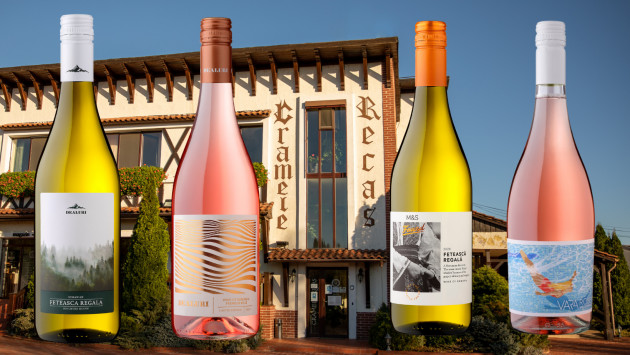
Long Read: Orange wine leads the pack at the newly organic Cramele Recas
Cramele Recas, Romania’s largest winery, has reached a major landmark in its march towards organic winemaking, with its first certificated organic wines now reaching the UK.
The first fully certified organic wines from the estate include an updated blend of Cramele Recas’s natural orange wine, which is organic as of the 2020 harvest, while also adding some amphora aging into the minimal intervention mix.
As of last year, around 15% of the new blend has been aged in 900ltr amphoras for around a month, with Muscat, Gewürztraminer, Pinot Grigio, Riesling and Sauvignon Blanc all making it into the new blend.
At the same time, a handful of other new wines are also making their way exclusively to UK supermarkets.
Dealuri Feteasca Regala, Dealuri Rose, which is to be sold in Aldi, and Found Feteasca Regala and Vara Rose (M&S), have now been made available in the UK market, circumventing Brexit-related border issues at the beginning of the year.
It’s not been an easy year, says owner Philip Cox. Between December and February, the Bristolian-born CEO says his “whole life was ruined by Brexit. It has just been very difficult”.
The wines, however, which were showcased to trade press this week, are part of an optimistic drive to transform the Cramele Recas portfolio over the past year or so, while also majoring on its status as eastern Europe’s biggest natural wine producer and leading the charge for indigenous Romanian grapes in key markets.
Despite listings being lost in Asda – “I guess some of the varieties were just too much for them” – the estate has had success in several areas with improvement within the winery and abroad.
As part of this, a total of €7m has been earmarked to make widespread improvements to the Cramele Recas operations in 2021, while also managing to grow sales in the UK over the past year. It has also been vegan since 2018 and was certified organic in 2020.
In particular, the re-blended orange wine is now being pitted as the standard bearer for the estate’s organic wines.
“There’s no yeast, no temperature control, no oak, no fining or sulphur added,” says Cox. “Just love and natural care. It’s been going very well. It’s mainly sold to specialised wine shops and bars and restaurants when and if they’re open. It’s been a growing trend that’s been good for us.”
With the Aldi and M&S launches, the estate is also making headway with Feteasca Regala, a cross of Feteasca Alba with Grasa produced in the 1920s, which helped to solve problems with flowering and yields.
“Some people think Grasa is maybe related to Furmint, and it’s certainly in the style of Furmint. But it’s actually a very authentic Romanian, ancient variety and when crossed, you get very good aromatics. It’s always refreshing and crisp and has good acidity,” Cox said.
While it’s the most popular white variety on the Romanian market, it is little known to the UK where Cox is aiming to move into a more premium segment.
Cox admits it’s a hard sell. The wines listed here retail from £4.99 up to around £10 for the Solomonar Reserve Red 2019 (Merlot, Cabernet Sauvignon and Feteasca Neagra), which was also included at the tasting.
But he’s optimistic about pushing those varieties that are “unique to Romania”, while focusing on the more premium wines, which come from some 1,250ha of owned wholly operated Cramele Recas vineyards.
“We want to grow these wines in the UK. We’re going to sell lots of wine in England this year, it’s an important step,” Cox said.
Cramele Recas is a major presence in Romania. It’s the country’s biggest wine exporter and winery by turnover. Half of all it makes is exported. It is also a major retailer in Romania where it owns and operates 130 stores.
The UK has been a much more difficult sell in recent years.
In total, the market has dropped from 70% of total exports in 2016 to just 10% in 2020. Cox admits this might be partly due to his decision to focus on other markets, like Germany, in anticipation of Brexit upheavals. Germany is now Cramele Recas’s number one export market.
However, despite moving focus away from the UK, having become “convinced that Brexit going to be a horrible **** up…we actually ended up selling more in England over the past year”.
So what’s next for the estate? Cramele Recas is also focusing on the new launch of its of its Dealuri Premium Romanian rosé, which was a favourite at the tasting.
Along with much of Romania, Cramele Recas has also taken advantage of EU grants which has led to mass replantings over the past couple of decades. This will continue along with the €7m investment fund to improve operations. This spans vineyards, warehouses, bottling lines, harvesters, and the development of a new laboratory, which has enabled the brand to “invest heavily” in biodiversity.
Keywords:
- new
- UK
- Organic
- Wines
- Cramele Recas
- first
- organic wines
- Feteasca Regala
- Orange Wine
- blend
- cramele
- dealuri
- feteasca
- regala
- new blend
- cramele recas’s natural
- natural orange wine
- minimal intervention mix
- muscat gewürztraminer pinot
- 900 litre amphoras




